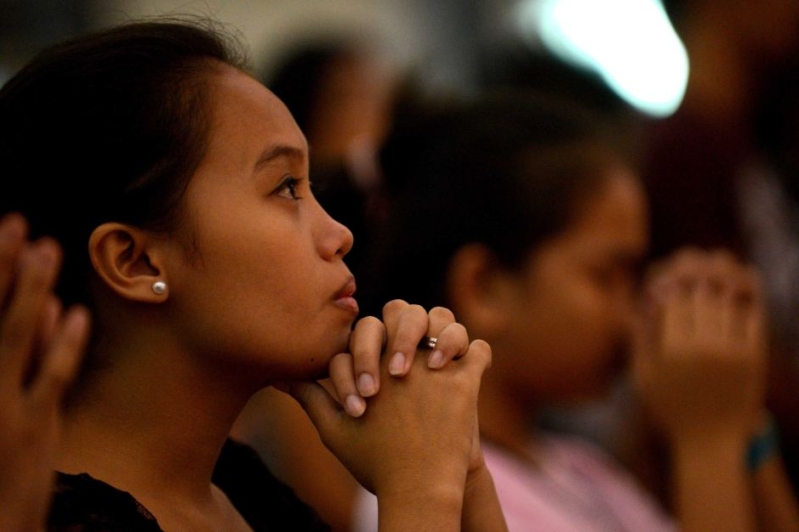
Nearly an entire village in the Philippines embraced Christianity after hearing the Gospel and viewing the 2004 film, "The Passion of the Christ," an indigenous ministry has revealed.
According to a report from Christian Aid Mission, an organization dedicated to assisting and promoting native missionaries overseas, a local ministry spent eight months building a relationship with the Manobo tribal peoples in northern Mindanao.
During that time, mission leaders held Bible studies, teaching chronologically through the narratives of the Hebrew Scriptures to the New Testament. Men, women and children began attending these sessions and expressed a tremendous thirst for the Gospel.
"The week before presenting the gospel lesson was a week of suspense," said the director, whose name is withheld for security reasons. "Everyone was in anticipation as to what would happen to Jesus after He was arrested by the Jewish leaders. To make the teaching of the gospel that night more vivid, the teacher inserted a brief video clip of the suffering and crucifixion of Jesus from the movie, 'The Passion of Christ.'"
After viewing "The Passion," which depicts the final twelve hours in the life of Jesus of Nazareth, on the day of his crucifixion in Jerusalem, many of the villagers were emotional, expressing anger at the mistreatment of Jesus by Jewish authorities and Roman soldiers.
"One of the old men emotionally said, 'How I wish I could be by Jesus' side and help Him!'" he said. "But after the truth had been explained concerning the death and resurrection of Christ as God's only provision for man's salvation, a feeling of awe and amazement was felt."
Moved by the sacrifice of Jesus Christ, many of the villagers professed faith in His death and resurrection, and embraced Christianity.
"Finally, after consistently teaching over the past eight months from Genesis onward, we were able to present the gospel, and nearly the whole village responded and trusted Jesus as their Lord and Savior," he said. "It was a great joy for us to see them understand the saving grace of Jesus for salvation; some cried as they shared their testimony of faith."
The next day, even more villagers shared how the Gospel had changed their lives. One elderly man who said he had put his trust in Jesus as the promised Messiah concluded, "He suffered so much for me. I'm glad He rose again from the dead."
The ministry shared one particularly heartwarming story of an 84-year-old woman, who said that she was grateful to hear what Jesus had done on the cross for her. She said that while she had little time remaining in this world, she knew that heaven was her sure home because of what Christ did for her.
"Many more Manobo, both children and adult, expressed faith in Jesus," the ministry director told CAM. "Truly, God is at work in the lives of these people, moving them from darkness to light, into His eternal kingdom."
According to the Pew Research Center, the Philippines is Asia's most Christianized country, and is the 5th largest Christian country on earth, with about 90% of the population being adherents. However, Voice of the Martyrs notes that Christians living in areas with significant influence from Muslim and Communist organizations have routinely faced threats, kidnapping and death.
In addition, the majority Catholics often mix native animistic beliefs into their practice. The ministry director told the organization that the people living in Mindanao previously had no knowledge of the resurrection of Christ or its significance.
"Statistically, it would appear that the majority of Filipinos are Christians," the director said. "However, while many people may consider themselves Christian, their beliefs are often mixed with former animistic rituals and superstitions. Secondly, as is true everywhere in Asia, Islam is on the rise and a constant threat to evangelization. Lastly, there are tribes that have never heard the gospel message."
CAM notes that the native beliefs of the various Manobo peoples involve many unseen and intrusive spirits, both good and evil. Each tribe holds to a "great spirit" that is usually viewed as a creator. Manobo legend also tells of how a man was created to live forever, but a bird traded man's "life breath" for a piece of kemp string, eliminating immortality.
"From that time on, the Manobo were taught that no one has been raised to heaven," the ministry director said. "Yet they still yearned to leave this world of poverty, sickness, hunger and death to a place of eternal bliss. Today, many of these villages have heard the gospel message and know they have a place in the eternal kingdom through Jesus Christ, their Savior."
Those wishing to help the spread the Gospel in the Philippines can give through Christian Aid Mission. To learn more about Christian Aid Mission, visit their website.







